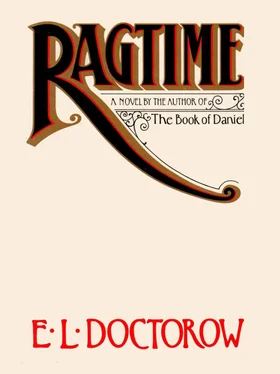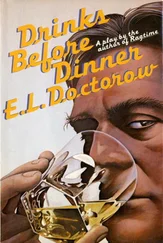Edgar Doctorow - Ragtime
Здесь есть возможность читать онлайн «Edgar Doctorow - Ragtime» весь текст электронной книги совершенно бесплатно (целиком полную версию без сокращений). В некоторых случаях можно слушать аудио, скачать через торрент в формате fb2 и присутствует краткое содержание. Жанр: Современная проза, на английском языке. Описание произведения, (предисловие) а так же отзывы посетителей доступны на портале библиотеки ЛибКат.
- Название:Ragtime
- Автор:
- Жанр:
- Год:неизвестен
- ISBN:нет данных
- Рейтинг книги:4 / 5. Голосов: 1
-
Избранное:Добавить в избранное
- Отзывы:
-
Ваша оценка:
- 80
- 1
- 2
- 3
- 4
- 5
Ragtime: краткое содержание, описание и аннотация
Предлагаем к чтению аннотацию, описание, краткое содержание или предисловие (зависит от того, что написал сам автор книги «Ragtime»). Если вы не нашли необходимую информацию о книге — напишите в комментариях, мы постараемся отыскать её.
Ragtime — читать онлайн бесплатно полную книгу (весь текст) целиком
Ниже представлен текст книги, разбитый по страницам. Система сохранения места последней прочитанной страницы, позволяет с удобством читать онлайн бесплатно книгу «Ragtime», без необходимости каждый раз заново искать на чём Вы остановились. Поставьте закладку, и сможете в любой момент перейти на страницу, на которой закончили чтение.
Интервал:
Закладка:
Such was the coming of the colored man in the car to Broadview Avenue. His name was Coalhouse Walker Jr. Beginning with that Sunday he appeared every week, always knocking at the back door, always turning away without complaint upon Sarah’s refusal to see him. Father considered the visits a nuisance and wanted to discourage them. I’ll call the police, he said. Mother laid her hand on his arm. One Sunday the colored man left a bouquet of yellow chrysanthemums which in this season had to have cost him a pretty penny. Before she took the flowers to Sarah, Mother stood at the parlor window. Out on the street the black man dusted his car, cleaned the wheel spokes, the headlamps and the windshield. He glanced up at the third-floor window and drove away. Mother now had cause to remember the expression on the faces of the Ohio seminarians who called on her when she was a girl of seventeen. She said to Father I think what we are witnessing is, in fact, a courtship of the most stubborn Christian kind. Father replied Yes, if you can call a courtship what has already produced a child. I find that an unkind remark, Mother said. There was suffering, and now there is penitence. It’s very grand and I’m sorry for you that you don’t see it.
The black girl would say nothing about her visitor. They had no idea where she met him, or how. As far as they knew she had no family nor any friends from the black community in the downtown section of the city. There was a settled society of Negroes there but also, on its margins, a transient element. Apparently she was a transient and had come by herself from New York to work as a servant. Mother was exhilarated by the situation. For the first time since the terrible day she had found the brown baby in the flower bed she saw a reason for hope for the young woman’s future. She began to regret Sarah’s intransigence. She thought of the drive from Harlem, where Coalhouse Walker Jr. lived, and the drive back, and she decided the next time to give him more of a visit. She would serve tea in the parlor. Father questioned the propriety of this. Mother said He is well-spoken and conducts himself as a gentleman. I see nothing wrong with it. When Mr. Roosevelt was in the White House he gave dinner to Booker T. Washington. Surely we can serve tea to Coalhouse Walker Jr.
And so it happened on the next Sunday that the Negro took tea. Father noted that he suffered no embarrassment by being in the parlor with a cup and saucer in his hand. On the contrary, he acted as if it was the most natural thing in the world. The surroundings did not awe him nor was his manner deferential. He was courteous and correct. He told them about himself. He was a professional pianist and was now more or less permanently located in New York, having secured a job with the Jim Europe Clef Club Orchestra, a well-known ensemble that gave regular concerts at the Manhattan Casino on 155th Street and Eight Avenue. It was important, he said, for a musician to find a place that was permanent, a job that required no traveling. I am through traveling, he said. I am through going on the road. He spoke so fervently that Father realized the message was intended for the woman upstairs. This irritated him. What can you play? he said abruptly. Why don’t you play something for us.
The black man placed his tea on the tray. He rose, patted his lips with the napkin, placed the napkin beside his cup and went to the piano. The sat on the piano stool and immediately rose and twirled it till the height was to his satisfaction. He sat down again, played a chord and turned to them. This piano is badly in need of a tuning, he said. Father’s face reddened. Oh yes, Mother said, we are terrible about that. The musician turned again to the keyboard. “Wall Street Rag,” he said. Composed by the great Scott Joplin. He began to play. Ill-tuned or not the Aeolian had never made such sounds. Small clear chords hung in the air like flowers. The melodies were like bouquets. There seemed to be no other possibilities for life than those delineated by the music. When the piece was over Coalhouse Walker turned on the stool and found in his audience the entire family, Mother, Father, the boy, Grandfather and Mother’s Younger Brother, who had come down from his room in shirt and suspenders to see who was playing. Of all of them he was the only one who knew ragtime. He had heard it in his nightlife period in New York. He had never expected to hear it in his sister’s home.
Coalhouse Walker Jr. turned back to the piano and said “The Maple Leaf.” Composed by the great Scott Joplin. The most famous rag of all rang through the air. The pianist sat stiffly at the keyboard, his long dark hands with their pink nails seemingly with no effort producing the clusters of syncopating chords and the thumping octaves. This was a most robust composition, a vigorous music that roused the senses and never stood still a moment. The boy perceived it as light touching various places in space, accumulating in intricate patterns until the entire room was made to glow with its own being. The music filled the stairwell to the third floor where the mute and unforgiving Sarah sat with her hand folded and listened with the door open.
The piece was brought to a conclusion. Everyone applauded. Mother then introduced Mr. Walker to Grandfather and to Younger Brother, who shook the black man’s hand and said I am pleased to meet you. Coalhouse Walker was solemn. Everybody was standing. There was a silence. Father cleared his throat. Father was not knowledgeable in music. His taste ran to Carrie Jacobs Bond. He thought Negro music had to have smiling and cakewalking. Do you know any coon songs? he said. He did not intend to be rude — coon songs was what they were called. But the pianist responded with a tense shake of the head. Coon songs are made for minstrel shows, he said. White men sing them in blackface. There was another silence. The black man looked at the ceiling. Well, he said, it appears as Miss Sarah will not be able to receive me. He turned abruptly and walked through the hall to the kitchen. The family followed him. He had left his coat on a chair. He put it on and ignoring them all, he knelt and gazed at the baby asleep in its carriage. After several moments he stood up, said good day and walked out the door.
The visit impressed everyone except Sarah, who gave no sign of relenting in her refusal to have anything to do with the man. The next week he returned, and the week after that. He was now visiting the family and each time brought them up on the news of his doings of the previous six days, never once assuming anything but their total and consuming interest. Father was put off by the man’s airs. She won’t see him, he told Mother. Am I to go on entertaining Coalhouse walker every Sunday for the rest of my life? But Mother saw signs of progress. Sarah had taken on the duties of the departed housekeeper and now cleaned rooms so energetically and with such proprietary competence that Mother laughed with the momentary illusion that it was Sarah’s own house she was cleaning. She also began to claim her child at other than feeding time, first taking over his daily bath, then carrying him upstairs to her room at night. Still she would not see her visitor. Coalhouse Walker appeared faithfully through the winter. More than once, when the roads were made impassable by snow, he came on the train and caught the North Avenue streetcar to the bottom of the hill. He wore with his fitted black overcoat a lamb’s-wool hat in the Russian style. He brought outfits for the child. He brought a silver-handled hairbrush for Sarah. Father had to admire his perseverance. He wondered to what extent a musician’s wages could sustain such gifts.
It occurred to father one day that Coalhouse Walker Jr. didn’t know he was a Negro. The more he thought about this the more true it seemed. Walker didn’t act or talk like a colored man. He seemed to be able to transform the customary deferences practiced by his race so that they reflected to his own dignity rather than the recipient’s. When he arrived at the back door he gave it a stout rap and when admitted would solemnly greet everyone and somehow convey to them the feeling that they were Sarah’s family, and that his courtesies to them simply measured the regard and respect he held for her. Father recognized certain dangers in the man. Perhaps we shouldn’t encourage his suit, he said to Mother. There is something reckless about him. Even Mathew Henson knew his place.
Читать дальшеИнтервал:
Закладка:
Похожие книги на «Ragtime»
Представляем Вашему вниманию похожие книги на «Ragtime» списком для выбора. Мы отобрали схожую по названию и смыслу литературу в надежде предоставить читателям больше вариантов отыскать новые, интересные, ещё непрочитанные произведения.
Обсуждение, отзывы о книге «Ragtime» и просто собственные мнения читателей. Оставьте ваши комментарии, напишите, что Вы думаете о произведении, его смысле или главных героях. Укажите что конкретно понравилось, а что нет, и почему Вы так считаете.












